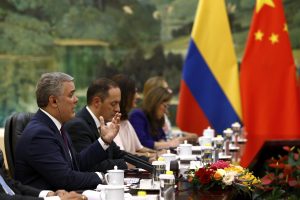Colombia has been cataloged as the “best friend” of the United States in Latin America. Besides the long common history between both countries, particularly during the Cold War, in the past two decades Washington and Bogota have truly come together on economic and foreign policy, starting with the “Plan Colombia” in 1998. The compatibility between the governments of Alvaro Uribe Velez (2002-2010) in Colombia and George W. Bush (2001-2009) brought convergence on the War on Terror and an FTA signed in 2006. Bush even gave Uribe the Presidential Freedom award in 2009. Cooperation advanced to the point that a defense agreement was signed in 2009 to allow U.S. military personnel to use Colombian military bases, but the following year the proposal was finally rejected by Colombians.
During the next decade, the Colombia-U.S. relationship continued to be especially close on security policies. Both armies are close, military exercises are executed regularly, and in 2017 Colombia became the first Latin American global partner of NATO.
Of course, this partnership implies close economic relations too. The United States remains the first trade partner of Colombia. Meanwhile, China became the second just a few years ago. But China’s economic engagement has been almost solely on the trade level. Investment and diplomatic relations between China and Colombia have been rather stale.
Nevertheless, in 2015 this started to change with the signing of a Technical and Economic Cooperation Agreement for investments and the official visit of Chinese Prime Minster Li Keqiang to Bogota.
Four years later, in October 2019, Chinese companies China Harbor Engineering and Xian Metro company won the tender for the most important infrastructure project in the capital city of Colombia: the first metro line in Bogotá. The project is estimated to cost $4 billion and the construction time is six years.
By stark contrast, between 2002 and 2019 China invested around $240 million total in Colombia. Further driving home the increased scale, last year it was confirmed by President Iván Duque Márquez that Colombia expects around $1 billion in Chinese investments in energy projects alone. Also, it was announced that the Bank of China and the China Development Bank will finance one of the 4G roads projects, which will improve the connectivity of Antioquia, a department with great economic importance in the country thanks to its access to the Caribbean Sea. Chinese companies also won tenders for the construction of a regional railroad and the control of one of the most important gold mines of Colombia.
On the strategic level, Duque made a visit to China in August 2019 and declared a new “roadmap” for relations with the Asian country. This includes donations for renewable energy projects, investment for infrastructure, deeper trade relations, a proposal for a direct flight in cooperation with Chinese airlines, among other aspects. During the visit, Duque even went to the Monument to the People’s Heroes in Beijing and paid his respects to the Chinese revolution martyrs.
Recently, current Chinese Ambassador Lan Hu announced to local press that Colombia and China are about to sign an agreement that includes infrastructure investment within the framework of the Belt and Road Initiative.
It is important to notice that Duque belongs to the political party “Centro Democrático,” cataloged on the far-right spectrum and led by none other than Alvaro Uribe Velez. As previously mentioned, the former president reinforced the rapprochement with the United States during the first decade of the 21st century, and it was expected that the current administration would follow a similar trend.
A 2019 report from the Atlantic Council regarding U.S.-Colombia relations has already highlighted that the increasing influence of China in Colombia is something worth noticing over the long term.
What we are seeing today might be just the first solid and public steps of China in this country, increasing their influence even in one of the staunchest regional allies of the United States. As the former Chinese Ambassador Xu Wei was quoted saying in a local magazine last year: “It is time to collect the harvest.” While there is still a long way to go regarding economic and diplomatic relations, it is worth keeping an eye on how far Chinese investment will go in the American hemisphere, especially in one of Washington’s main allies.
Juan Camilo Martínez Garcia is a Colombian international relations professional specializing in Asia-Pacific studies.

































